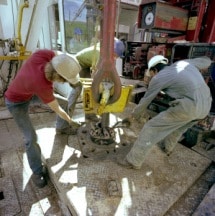A report released today by Food and Water Watch (FWW) titled, “Exposing the Oil and Gas Industry’s False Jobs Promise for Shale Gas Development: How Methodological Flaws Grossly Exaggerate Jobs Projections,” exposes one of the key lies at the heart of the domestic oil and gas debate in the United States – inflated jobs potential.
“The oil and gas industry has tried to stand on three legs, claiming that shale gas is good for the environment, good for American energy security and good for the economy. The first two legs have already been kicked out, and our new analysis kicks out the third,” said Food & Water Watch Executive Director Wenonah Hauter in a press release. “They have no legs left to stand on.”
Jobs Numbers Hugely Overestimated
FWW‘s study hones in on the arguments made in the July 2011 report written by the Public Policy Institute of New York State (PPINYS), titled, “Drilling for Jobs: What the Marcellus Shale Could Mean for New York.” That report concluded that by 2018, the development of 500 new shale gas wells each year in five key counties in the state of New York could create 62,620 new jobs.
The report is often cited in the mainstream media, particularly when attemping to “balance” arguments against fracking in the Marcellus Shale and other shale basins around the United States, namely that it is a dirty fossil fuel with a procurement process that is inherently toxic.
After sifting and winnowing through the scores of methodological flaws found in the PPINYS report, FWW discovered that, contrary to the rosy jobs numbers publicly disseminated, very few jobs will actually be created by drilling in these counties, and PPINYS has grossly over-projected job creation.
Rather than over 62,000 potential jobs, FWW‘s study shows that only 3,469 jobs would be created – a stark difference indeed.
He Who Pays the Piper Calls the Tune: Follow the Echo Chamber
PPINYS‘ “study” heavily relies on data from another “study” published in May 2010 by Pennsylvania State University professors Timothy Considine, Robert Watson, and Seth Blumsack titled, “The Economic Impacts of the Pennsylvania Marcellus Shale Natural Gas Play.” That work was funded by the Marcellus Shale Coalition, a gas industry lobbying group representing nearly all of the corporations fracking for gas in the Marcellus.
PPINYS is an associate member of the State Policy Network, a right-wing clearinghouse of state-level think tanks located throughout the United States, funded by the likes of the Bradley Foundation, the John M. Olin Foundation, and the Koch-funded Claude R. Lambe Charitable Foundation.
Furthermore, PPINYS is also affiliated with The Business Council of New York State, according to its website, and two out of nine members of its Board of Trustees are members of The Business Council. Another member of its Board of Trustees, James W. Kinnear, is the former CEO of Texaco, which has since been purchased by Chevron. Kinnear is still listed as representing Chevron on The Business Council website, though his biographical sketch located on Bloomberg Businessweek shows him as the Director of Saudi Arabia Oil Company.
The Business Council, lo and behold, is also heavily funded by the oil and gas industry. The Chairman of the Board of Directors, David Smith, is the Chairman and CEO of Natural Gas Fuel Company. Smith is also on the Board of Directors of the American Gas Association.
Also on the Board is the CEO of CH Energy Group, Steven Lant, and Robert Prantil, the North Region Executive of General Electric – both of the corporations they represent have a major stake in the shale gas boom.
Member corporations and industry groups of the Council include the likes of the Independent Oil & Gas Association of New York, the Northeast Gas Association, and the New York State Petroluem Council. All of these consortiums, in turn, are also heavily funded and represented by the oil and gas industry.
As the old adage goes, “He who pays the piper calls the tune.” In other words, if the industry cannot actually create jobs, it can surely fund sham studies of the sort exposed by FWW, hand them off to willing media stenographers, who then pass them off as facts-on-the-ground to the public.
One can only hope this trend changes with this latest FWW report.
Subscribe to our newsletter
Stay up to date with DeSmog news and alerts







